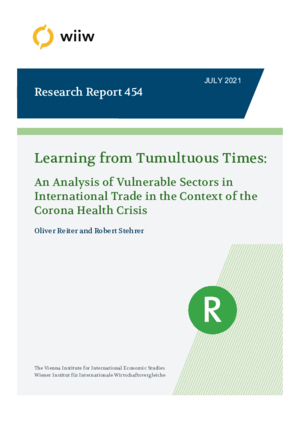Learning from Tumultuous Times: An Analysis of Vulnerable Sectors in International Trade in the Context of the Corona Health Crisis
Oliver Reiter and Robert Stehrer
wiiw Research Report No. 454, July 2021
63 pages including 9 Tables and 21 Figures
The COVID-19 pandemic marks an unprecedented shock to global growth and trade and brought international dependencies into the spotlight. This triggered discussions on resilience and robustness of global value chains. In this paper we assess which products can be considered as vulnerable to trade shocks at the global level – referred to as ‘risky’ products – by constructing a ‘product riskiness indicator’ for 4700 globally traded products based on components such as market concentration, clustering tendencies, network centrality of players, or international substitutability. In a second step the bilateral imports of risky products are matched to multi-country input-output tables enabling the analysis of the importance of internationally sourced risky products by country and using industries. Higher-tech industries are more prone to supply-chain vulnerability given the large share of risky products in high-tech product categories. Third, we apply a ‘partial global extraction method’ to assess the GDP impact of reshoring. Assuming that imports of risky products are re-shored from non-EU27 to EU27 countries suggests an increase in the EU27 GDP of up to 0.5%. The non-EU27 countries lose from such re-shoring activities accordingly. This suggests that it is also in the interest of the supplier countries and industries to assure robust or at least resilient supply chains. Finally, selected policy aspects in the context of the envisaged EU Open Strategic Autonomy are debated.
Keywords: supply chains, vulnerability, resilience, robustness, global extraction method
JEL classification: F14, F17, F52
Countries covered: non specific
Research Areas: International Trade, Competitiveness and FDI
Press Releases
- Lieferketten: Ein Drittel aller Importe in der EU anfällig für Schocks (German)
- Lieferketten: Ein Drittel aller Importe in der EU anfällig für Schocks (German)
- Covid-19 shows vulnerability of supply chains (English)
- Covid-19 shows vulnerability of supply chains (German)
